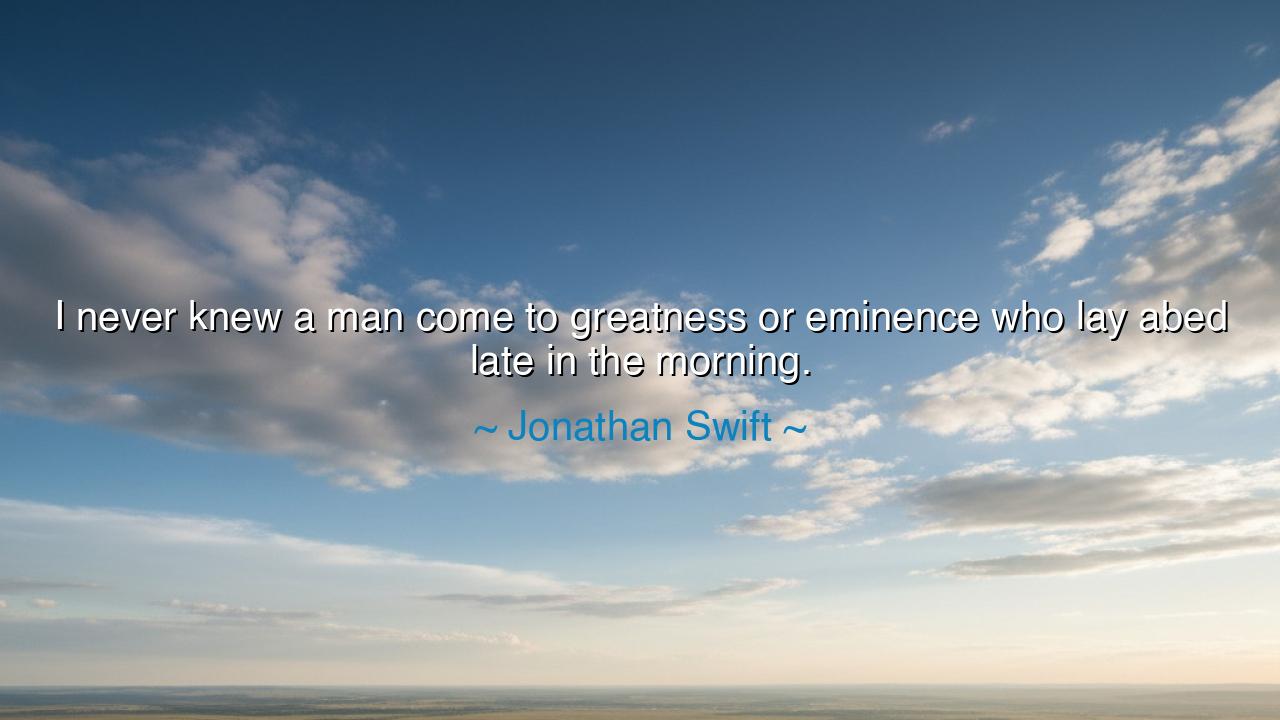
I never knew a man come to greatness or eminence who lay abed






In the words of Jonathan Swift, “I never knew a man come to greatness or eminence who lay abed late in the morning.” With these words, Swift speaks not merely of sleep or waking, but of discipline, urgency, and the sacred duty of labor. He calls us to understand that greatness is not found in the comfort of the bed, but in the struggle of the day. The dawn is the ally of those who would rise above mediocrity, and the slothful spirit that lingers too long beneath the covers surrenders its destiny to idleness.
The heart of Swift’s teaching lies in the marriage between discipline and opportunity. To rise early is to honor time itself, to claim the fresh hours when the mind is sharpest and the world is yet uncluttered. Those who meet the morning with vigor seize an advantage that idlers cannot grasp. The ancients understood this truth well; the farmer in his field, the general in his camp, the scholar at his lamp—each began their labors before the sun had risen high. Swift reminds us that such diligence is not mere habit, but the very soil from which eminence grows.
Consider the story of Benjamin Franklin, who shaped his days with rigorous discipline, rising with the dawn to ask himself, “What good shall I do this day?” It was this habit of seizing the morning that allowed him to become not only a statesman but a scientist, a printer, and a philosopher. Had he chosen instead the indulgence of late hours, the world might never have known his wisdom or inventions. Franklin’s life is proof of Swift’s assertion: the path to greatness begins with the mastery of one’s time.
Yet this truth is not confined to statesmen or scholars. Look to the generals of Rome, who roused their legions before first light, for they knew that battles—and empires—were won by those who acted before others stirred. Julius Caesar’s campaigns were marked by relentless speed, his armies moving at dawn while his enemies yet slumbered. The rise of his power was not only in strategy, but in the discipline of never wasting the earliest hours. Swift, in his quote, speaks with the voice of such men: greatness does not lie with those who linger, but with those who rise.
There is also an emotional depth in Swift’s words, for he warns us of the danger of wasted life. Each day is a gift, and each morning is a beginning. To cast away the early hours in slumber is to squander the very moments when the spirit is most alive. It is not that sleep is evil—indeed, it restores the body—but that indulgence beyond necessity dulls the edge of ambition. To “lay abed late” is not merely to rest, but to delay one’s destiny.
This wisdom can be carried into the modern age. Though not all may command armies or shape nations, each of us commands our own life. The tasks may differ—learning, working, creating—but the principle remains. He who masters the morning gains mastery of himself, and he who gains mastery of himself is prepared for any challenge. Swift’s admonition is timeless because it speaks to the universal truth that greatness is built, hour by hour, in the quiet labor that others neglect.
So, O listener, take this teaching into your heart: rise with purpose. Do not treat the dawn as an enemy but as a companion, for it offers you a treasury of hours that cannot be reclaimed once lost. Guard against the laziness that whispers, “Stay abed, there is time enough.” Instead, rise and act, as though each morning were your summons to destiny.
For in the end, the lesson of Swift is clear: greatness is not granted, it is earned—and it is earned in the hours that others waste. If you would reach eminence, then rise with the sun, take hold of the morning, and let your deeds be the proof that you did not lie idle when the call of destiny came.






AAdministratorAdministrator
Welcome, honored guests. Please leave a comment, we will respond soon